Allmusic.com included Come to Life, the latest from Memphis rapper Cities Aviv, among its featured releases for the week. Congratulations.
Month: January 2014
The Dragnificent Variety Hour
Friends of Georges and the production team behind George’s Truck Stop and Drag Bar will present a new drag-themed musical, The Dragnificent Variety Hour, this weekend at Evergreen Theatre.
The original sketch comedy production will feature local drag queens and plenty of over-the-top production numbers.
“We all love shows like The Carol Burnett Show and Sonny and Cher,” says Friends of George’s Tracy Love. “Those shows were so much fun because of all the amazing guest stars and production numbers. We really wanted to create something in that genre.”
Sketches will include “The Tea (a parody of the The View) and “Drag in a Bag” (a parody of the Home Shopping Channel) among others.
The show will go on at 8 p.m. on Friday, January 31st and Saturday, February 1st. Tickets are $20 and are on sale at friendsofgeorges.org and at the box office while they last.


Memphis College of Art students turn typical apartments into stylish living spaces for the “ReStore for More” design contest. A collaboration between the Habitat for Humanity of Greater Memphis ReStore, The Venue Apartments, and Memphis College of Art, the contest features three teams tasked with creating the best redesign of a 1-bedroom apartment in Midtown’s The Venue Apartments. They were asked to use pieces from the Habitat ReStore and even build their own furniture and built-ins with reclaimed material. With a tight budget of $650, the students learned hands-on how to be creative in a real-world environment.
The last open house is tonight from 4-7pm where you can tour the 3 redesigned apartments and cast your vote to help the students win cash prizes and a chance to live in their winning space rent-free for 6 months. First, let’s introduce the teams.
[jump]


Carly Lyons and Bailey Bracato of team Double M designed around the theme of Memphis and music. A theme prominently demonstrated with the old cassette tapes that screened the kitchen cabinet doors. A custom tile mosaic acts as the backsplash. Overall, the low warm lighting and richly dark furniture took on a vintage style.


Laura Miller and Jess Vandenberg of team Modern West use their eye as graphic designers to pull together patterns and colors for a bright and modern space. The accent wall is a linear mosaic of reclaimed wood trim. The dining table reused a wooden pallet and traditional table legs in a modern color.


Sam Herwehe and Evan Lebaroff of team Handmade American combined wood, metal, leather and concrete materials for an industrial look. The minimal bar height dining table is built into the space, while the stools, unexpectedly covered in Astroturf, gave just the right amount of artistic whimsy.
Make sure to visit the open house tonight to experience the space for yourself and admire the details. Particularly, if you’re looking for a stylish place to live, these apartments are available for rent when the contest ends. Good luck to all the students.
Voting Details
In-Person at The Venue Apartments (1387 Central) Friday, 9:30 a.m.-4:30 p.m. and Saturday, 11 a.m.-5 p.m. In-person votes count double and ends Feb. 1st, 5 p.m.
Online at www.facebook.com/thevenuememphis until 5 p.m. on Feb. 3. The public simply needs to look at the ReStore for More Voting gallery and “like” the photos of the project they like best. Each ‘like’ counts as one vote.
Matchless in Memphis
Kerry Crawford writes about the perils of online dating.
American Born Moonshine
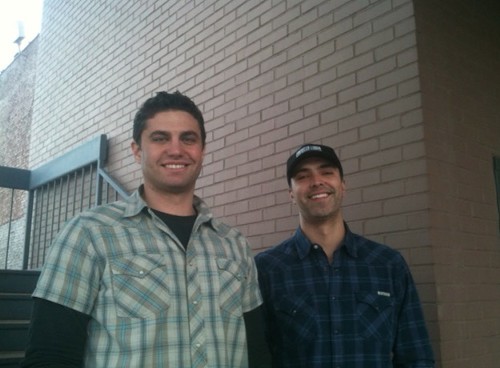
On Monday, Sean Koffel and Pat Dillingham, the founders of the Nashville-based American Born Moonshine, stopped by the Flyer offices to offer samplings just hours before a party officially launching the brand in Memphis.
American Born comes in three varieties: the 103 proof Original, the 83 proof Apple Pie, and the 83 proof Dixie, made with sweet tea. American Born is in local liquor stores, priced around $24.99. It’s also served at various bars around town.
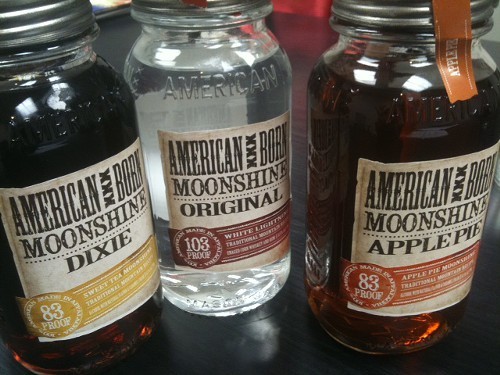
Sean, 31, and Pat, 30, say they met while students at Stanford, and while their backstory does include some moonshine-drinking, Pat says, “Our motivation is to honor the true story. It’s not a story about a bunch of guys getting drunk.”
The story, as they tell it, is a purely American one shot through with the spirit of independence, tracing back to 1680 in Jamestown and continuing through the Whiskey Rebellion, the Civil War, and Prohibition.
[jump]
Indeed, the Original hews to tradition as an un-aged corn whiskey, and the Apple Pie, made with apple juice and a cinnamon stick, is based on one of the oldest moonshine recipes around. (As for the sweet tea Dixie moonshine, that was “the product of several nights of drinking,” says Sean.)
The pair point out that everything about American Born is American-made — from the booze to the mason-jar bottle to the label.
The “Don’t Tread on Me” emblem is embossed on the side.
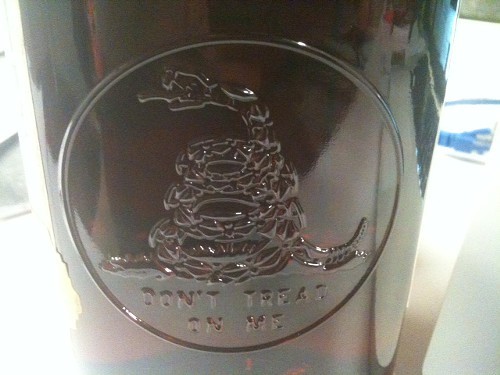
The three stars from the Tennessee flag appear on the bottom on the bottle.

American Born’s bottles also have a unique lid.
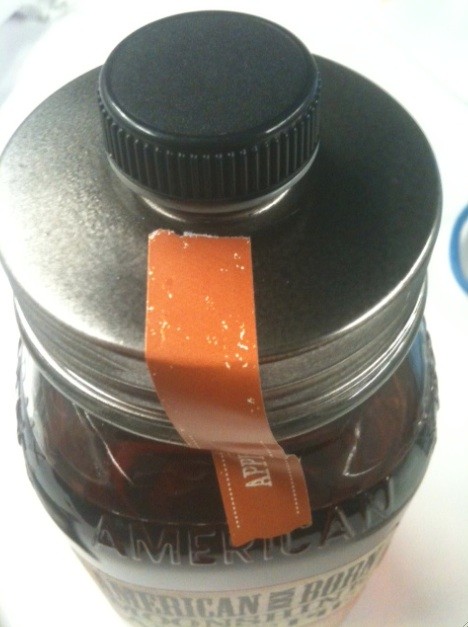
The top screws off, the better to pass the bottle around to share swigs. The lid also has a removable cork for more accurate pours.
The American Born site features cocktails recipes, including the General Lee, made with the Original and Red Bull.

- Larry Kuzniewski
- Courtney Lee had his quietest game as a member of the Grizzlies Wednesday night.
I, for one, didn’t really enjoy watching last night’s game for much of it—I tweeted at one point that watching the game closely felt like reading a tax document: tedious, without feeling. It looked like the Grizzlies were playing that way at first, too, with a cold shooting start reminiscent of the first quarter against Houston on Saturday night. The problem for Memphis was that Sacramento wasn’t also on the second night of a back to back, and ran out to an early lead.
There were also moments when it felt like former Grizzly Rudy Gay was in the midst of having one of “those games” where he banked in threes and got to the rim at will, looking liberated (and with his usage rate way up) in the absence of DeMarcus Cousins. As the game wore on, though, the fears of a Big Rudy Gay Game disspated much the same way Gay’s scoring did, and he finished the night with 23 where early it looked like he might drop 35.
For the next 36 minutes of basketball, it felt like the Grizzlies were perpetually 3 points ahead of the Kings, barely doing enough on defense to stay ahead while scoring just enough for the Kings to stay behind. The bench was mostly quiet, and it was just… nothing. Nothing really happened.
By the end of the third quarter, the Grizzlies had accrued a six point lead, and finally something clicked and the Griz—particularly Mike Conley and Tayshaun Prince (!)—went off for a thirty point quarter, sealing the ten-point victory. It was a good showing from a team that hadn’t really “turned it on” yet all game, and it was good enough to get the Grizzlies headed to Minnesota with a 2-0 start to the current four-game-in-five-night stretch.
Two Things I Liked:
• Mike Conley continues to amaze and astound me with the level of his play. Against Sacramento, he displayed the same killer instinct he showed against Portland—a willingness to be the guy to hit the big shot with the game on the line, without remorse, without worrying about what anyone else is doing. A basket needed to be made, and so Mike Conley made it. That’s something Conley has shown this year that has been slow to develop in him, but this season, it finally seems to have blossomed, allowing him to be the “I’ll take the last shot” player that Griz-watchers have long hoped he would be. It’s a welcome development, and it’s a big reason the Grizzlies are where they are this season, rather than on a month-long Tank Quest kicked off by Gasol’s injury.
• Tayshaun Prince made some great plays in the fourth quarter—a steal followed by a dunk in transition on Rudy Gay, and another one trailing a Mike Conley fast break, along with some solid contributions on both ends of the floor. Prince has struggled mightily this season overall, but last night he showed some flashes of “Oh yeah, he’s Tayshaun Prince” that probably reminded Griz fans who weren’t watching the championship-era Pistons exactly what that means. I’m not sure what the ultimate answer is to the Prince Conundrum, but for now, at least in fourth quarters against certain matchups, the answer is to play him. He certainly came up big last night.
Two Things I Didn’t Like:
• Courtney Lee had his quietest game as a Grizzly so far, scoring only 4 points on 2 of 4 shooting and attempting no 3-pointers in 24 minutes. Not sure what the reasoning for that was, beyond the Grizzlies’ general offensive woes translating into a lack of open shots for Lee, or a lack of opportunities to hit the pull-up shots he’s been nailing with abandon as of late, but no matter the cause, his off night was either part of the reason (or part of the collateral damage) the Grizzlies’ spacing on offense was less than stellar last night, overloading the strong side on offense the same way they do on defense which, well, isn’t usually a good thing. With any luck it was just an off game, and Lee will bounce back in Minnesota on Friday night.
• Mike Miller was finally starting to string together some good games, playing within himself and hitting some shots (5-11 for 11 points last night, though only 1-6 from long range) and then he sprained his thumb last night towards the end of the game, and is now listed as day-to-day. It was inevitable that Miller would get hurt at some point this year; his history recently proves it would be foolish to expect him to stay completely healthy. But it’s frustrating to see him get injured just as he was starting to pull out of the slump he’s been in, a slump that’s seen Dave Joerger play him too many minutes while his offense production has been zero or close to it. Hopefully the injury is just a blip and won’t keep him out of the rotation for an extended amount of time. It’d probably also be a good idea to get Jonny Basketball out on the floor to take some threes in his absence.
Some things take a while to process. In 2010 the founding artists of Chicago’s New Colony theater company were planning their third season when Memphis actor Mary Hollis Inboden blurted out something that not everybody in the room understood.
“I think I might want to do something about West Side,” said Inboden, who grew up in Jonesboro but attended the U of M and appeared in numerous Memphis productions including Talking With at TheatreWorks and Anton in Show Business at Circuit Playhouse.
Playhouse on the Square alum and New Colony playwright Evan Linder was a close friend of Inboden’s though and knew right away what she meant. He hadn’t lived through the terror in the same way she had but having been a junior high school student in the Memphis suburbs he remembered the West Side playground shooting which occurred March 24, 1998.
“At 26, I was ready to talk about the shooting at West Side Middle School and I knew I couldn’t do it by myself,” Inboden explained in a 2013 interview with the Flyer prior to The Warriors Memphis premiere. “I needed the talent family of The New Colony and the blessing from my childhood friends from the playground that day.”
24 of the 35 survivors responded to Inboden with approval and current details about their daily lives as adults, survivors, and parents with their own children to protect. Those details formed the foundation of The Warriors, which is currently being produced by the McCoy Theatre at Rhodes College.
“Evan and I had two rules we followed diligently,” Inboden says. “The Warriors would not sensationalize the shooting on my playground and it would not be a story of the actual shooting. In following these rules we created a gentle story of survival, what it means to experience childhood trauma and move forward.”
Rhodes revival of “The Warriors,” directed by Julia “Cookie” Ewing and Kevin Collier, and performed January 31, and Feb 1 at 7:30 p.m. is a collaborative effort giving the Theatre, Psychology, Anthropology and Sociology departments a common cause. In addition to performances there will be a talkback and lecture. Check below the fold for details.
[jump]
January 31 and February 1 at 7:30pm: The Warriors with a post-show discussion, McCoy Studio Theatre
January 30 at 5pm: Dr. Matthew Wilkinson, assistant professor of sociology at Coastal Carolina University will speak on Root Causes of School Violence: Confronting the Culture of Incivility
Abstract: The initial response to many high-profile school shootings is to blame the outburst on some pathology of the individual perpetrator. But looking to the individual for explanations obscures the role of the larger social environment, preventing critical examination of a much larger social problem. Research on this problem is shifting from the individual level of analysis to include consideration of the “toxic social environments” of schools.
While school shootings are statistically rare events, countless adolescents experience stressful school environments yet choose alternative outlets for their frustrations. Some adolescents may externalize their problems, through vandalism, bullying, or violence, while others may internalize them, developing anxiety and depression. This lecture explores the causes of school shootings and strategies for coping with such violence.
On January 1st, the nation’s first marijuana retail stores opened in Colorado. This landmark event came approximately 14 months after Colorado voters approved a constitutional amendment in November 2012 to legalize the recreational use of marijuana. Washington State has enacted similar legislation, and Washington, D.C., and at least 20 states — including Colorado and Washington — have authorized the use of marijuana for medical purposes.
This month, state Representative Sherry Jones (D-Nashville) introduced HB1385, legislation to allow people suffering from certain diseases to use marijuana to treat their symptoms, if their doctor states that its benefits outweigh its health risks to that patient.

Here’s a caveat: Despite new state laws liberalizing marijuana use, it is still illegal to possess and use marijuana under the federal Controlled Substances Act, which lists marijuana as a Schedule I controlled substance, indicating it has high potential for abuse and has not been accepted as a safe form of medical treatment in the U. S.
More recent guidance suggests that the Department of Justice will prioritize the prosecution of marijuana-related crimes of national significance, which excludes many individual recreational users. However, the Controlled Substances Act remains unchanged. Employers may therefore take comfort in the fact that both medicinal and recreational marijuana use continue to be prohibited under federal law.
In Colorado, employers will also be insulated from employee claims of discriminatory practices or privacy violations by the text of the enabling legislation — Amendment 64, itself. The Act specifically states that employers reserve the right to continue drug testing and similar practices. It further states that employers may restrict the possession, distribution, or use of marijuana on company property.
Recent litigation involving marijuana in the workplace has focused on whether employers in states that have decriminalized medicinal marijuana can restrict its use outside of working hours. Despite Colorado’s legalization of medical and recreational marijuana, much controversy has centered on whether these uses can be properly described as lawful.
Employers in Colorado have the authority to enforce company policies restricting employees’ lawful activities when the policy relates to an occupational requirement; when the policy relates to an employee’s particular job responsibilities; or when a conflict of interest may result. If any of the three statutory exceptions apply, employers have firm legal grounds to administer drug tests and terminate employees who test positive.
Similarly, the U.S. District Court for the District of Colorado agreed that the Colorado State’s Lawful Activities Statute does not extend to an employee’s firing due to medical marijuana use. In Curry v. Miller, the court held that employers are entitled to implement and enforce written drug policies, and Colorado’s statute does not shield an employee from the company’s standard practices. Put simply, the plaintiff employee had been terminated because of his misconduct, rather than because of his disability.
Since individuals with severe illnesses and disabilities are afforded more protection under the law than healthy people, it is unlikely that the courts would afford protection to employees who use marijuana recreationally. We can therefore expect courts to lean just as heavily in favor of employers once disputes arise in the wake of Amendment 64.
Colorado’s growing body of case law serves as a reliable indicator of how other jurisdictions will treat the same or comparable issues. Washington State — which is expected to open retail marijuana shops this year — has similarly dismissed medicinal marijuana users’ claims against employers. The Supreme Court of Washington explained that allowing such actions for wrongful termination directly conflicts with the state’s long-standing at-will employment doctrine.
While public policy may in some instances overcome the state’s deference towards employers in termination decisions, the court found that a clear public policy existed against forcing employers to sanction their employees’ illegal activity.
In sum, Colorado’s Amendment 64 has not resulted in the complete legalization of marijuana in Colorado. As a best practice, all employers should reiterate to employees that violations of federal controlled substance laws are still grounds for termination and revise their corporate policies as necessary.
While it may be some time before medical or recreational use of marijuana is legalized in Tennessee, employers should keep an eye on this developing trend.
Robert Meyers and Meghan McMahon of the Glankler Brown law firm focus their practice on representing employers. Neither smokes marijuana nor advocates its use.
For some decades, the medical world — and those lay people whose destinies brought them in contact with it sadly, apropos potential responses to cancer — has been acquainted with a phenomenon called HeLa cells.
These were malignant cells — used for research and medical experimentation the world over — that derived originally from a single tumor that had belonged to a patient whose name was believed to have been Helen Lane.
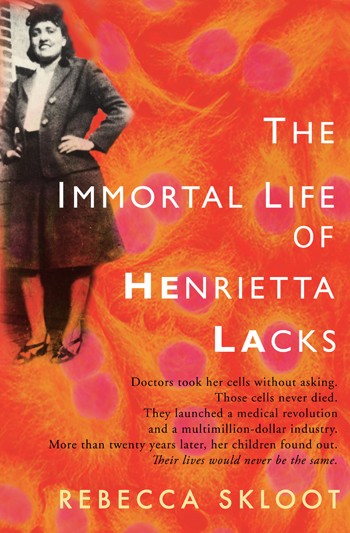
The cells were unusually virulent — so much so as to serve so distinct and widespread a purpose. Indeed, they were, and are, regarded as immortal, and by now have been cultivated and dispersed so widely for so many different purposes as to weigh, by informal estimate, the equivalent of 150 Empire State Buildings.
So far the story is interesting, even uniquely so. But it gets more so, in numerous ways. In 2010, an author/researcher named Rebecca Skloot published a book, The Immortal Life of Henrietta Lacks, that transformed the way in which both the ubiqutous HeLa cells and the supposed “Helen Lane” herself were regarded.
Skloot was in Memphis this week as the featured speaker of the Memphis Rotary Club’s regular Tuesday luncheon — which this week was also a climactic focus of a “big club” national Rotary conference for which the Memphis club served as host. The conference began Sunday night at The Peabody with a spirited keynote address to the attendees by Dick Enberg, the well-known sports broadcaster.
Skloot, though, was the piece de resistance. Reminding those attendees who had read her book and explaining to those who hadn’t, she noted the first basic fact — that the soap-opera-sounding “Helen Lane” was a figment of some researcher’s imagination. The actual — unintentional — donor of the HeLa cells was one Henrietta Lacks, an African-American woman from an impoverished family in Maryland who developed cervical cancer and was admitted to Johns Hopkins Hospital in Baltimore as a charity patient.
The dime-sized tumor that was extracted from Lacks was a godsend to medicine. HeLa cells were vital not only in cancer research but in numerous other medical breakthroughs, including the development of early polio vaccines. But as Skloot documents, the saga of Henrietta Lacks (who died within six months of initial treatment) had analogues to more sordid medical researches — like that of the African-American syphilis patients in Tuskegee, Alabama, some of whom were purposely infected with syphilis, and all of whom were allowed to die without treatment while the progress of their disease was tracked.
Nothing that graphic happened in the case of Henrietta Lacks. Nor did such malpractive affect the members of her family, who subsequently also become medical subjects. Eventually — thanks in part to the efforts of Skloot, who now runs a foundation to benefit unwitting former subjects of medical experimentation — a protocol has been accepted in medical circles that expands the rights of such patients and has firmed up the concept of patient consent.
But ethical questions remain, and, considering the astounding number of ways in which medical samples are routinely collected from all of us, it remains true, as Skloot reminded the Rotarian conferees, that “in some way, everyone is a potential Henrietta Lacks.”
High Tide
Riding the high of national wins for medical marijuana advocates, Representative Sherry Jones (D-Nashville) is sponsoring the Koozer-Kuhn Medical Cannabis Act, which would legalize medical marijuana use in Tennessee for specific medical conditions.
In 2012, a similar bill made it to committee before being withdrawn by the sponsor, former Democratic Representative Jeanne Richardson of Memphis. Since then, four additional states have legalized medical marijuana, bringing the total number of states with legalized medical pot to 21.
“We decided to make it strict because we wanted to be able to pass it and, considering that the state is Republican-controlled, we felt like that was the best way to go,” Jones said.
With the Koozer-Kuhn Medical Cannabis Act, in order to enroll in the Safe Access program, the patient’s doctor would have to complete a full medical history assessment along with a statement saying the patient would benefit from medical marijuana for his or her qualifying medical condition, which includes cancer, glaucoma, multiple sclerosis, HIV, AIDS, Crohn’s disease, Alzheimer’s, and — newest on the list — post-traumatic stress disorder, among others.
According to the bill, chronic diseases not named must produce “wasting syndrome; severe, debilitating, chronic pain; severe nausea; seizures; [and] severe and persistent muscle spasms.”
Medical conditions with required hospice care, toward the end of a patient’s life, could also qualify for medical marijuana. The bill also does not require insurance companies — either government-assisted or private — to reimburse patients for the cost of marijuana, nor does it force employers to accommodate marijuana in work environments.
Medical marijuana, if legalized through the bill, could not be used in any public place or any space that “significantly and adversely affects the health” of children.
The bill also specifies regulations for growers and dispensaries that would be operating from the newfound legality of marijuana, including oversight rules from the Department of Agriculture and the Department of Health.
Paul Kuhn, who sits on the Board of Directors for the National Organization for the Reform of Marijuana Laws, is a marijuana advocate in Nashville. His wife, Jeanne, used marijuana during chemotherapy before passing away from breast cancer in 1996 — a story that is all too common with cancer patients, Kuhn said.
“We’re hopeful that since there is such a national movement that we might be able to get some movement here in Tennessee, but we’re going to present it, and we’re going to do the best we can with it,” Jones said. “I think the national politicians see where this is going. I hope that Tennessee politicians will see where this needs to go.”
